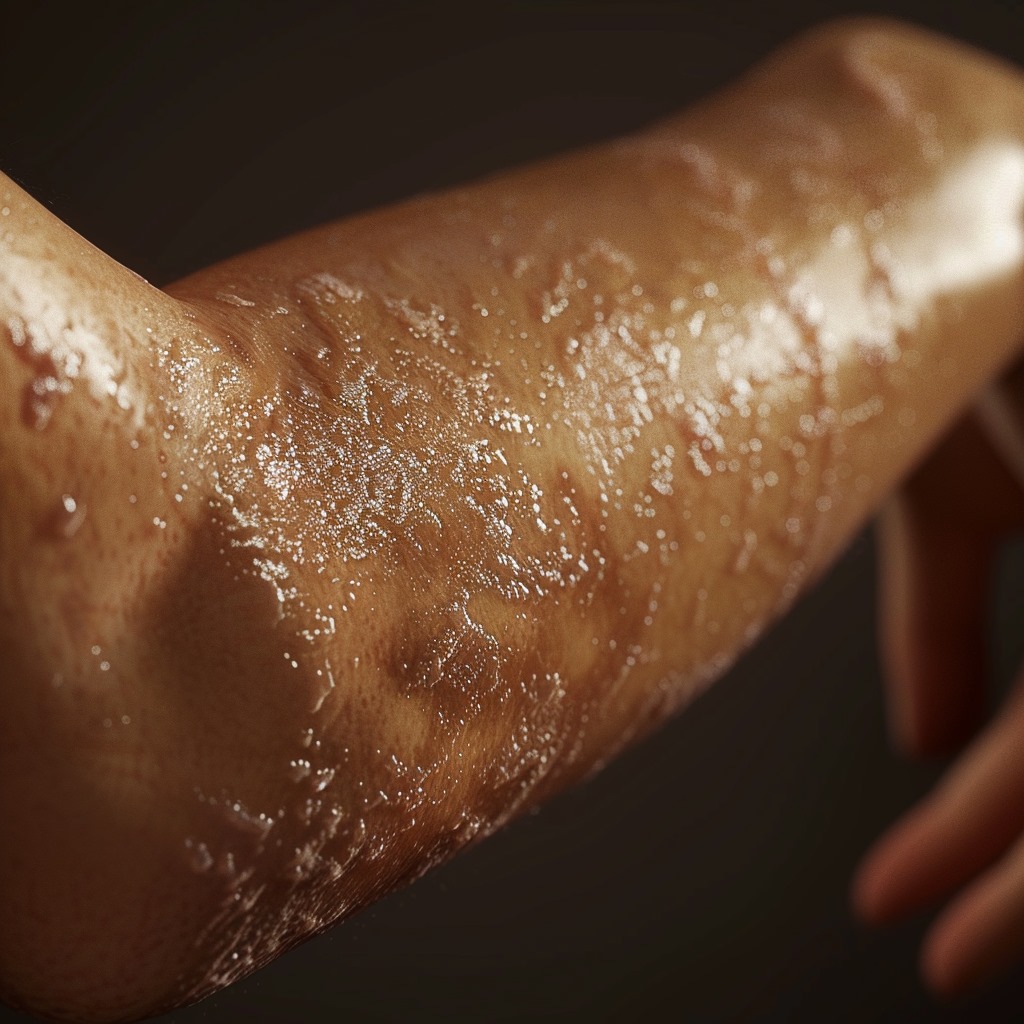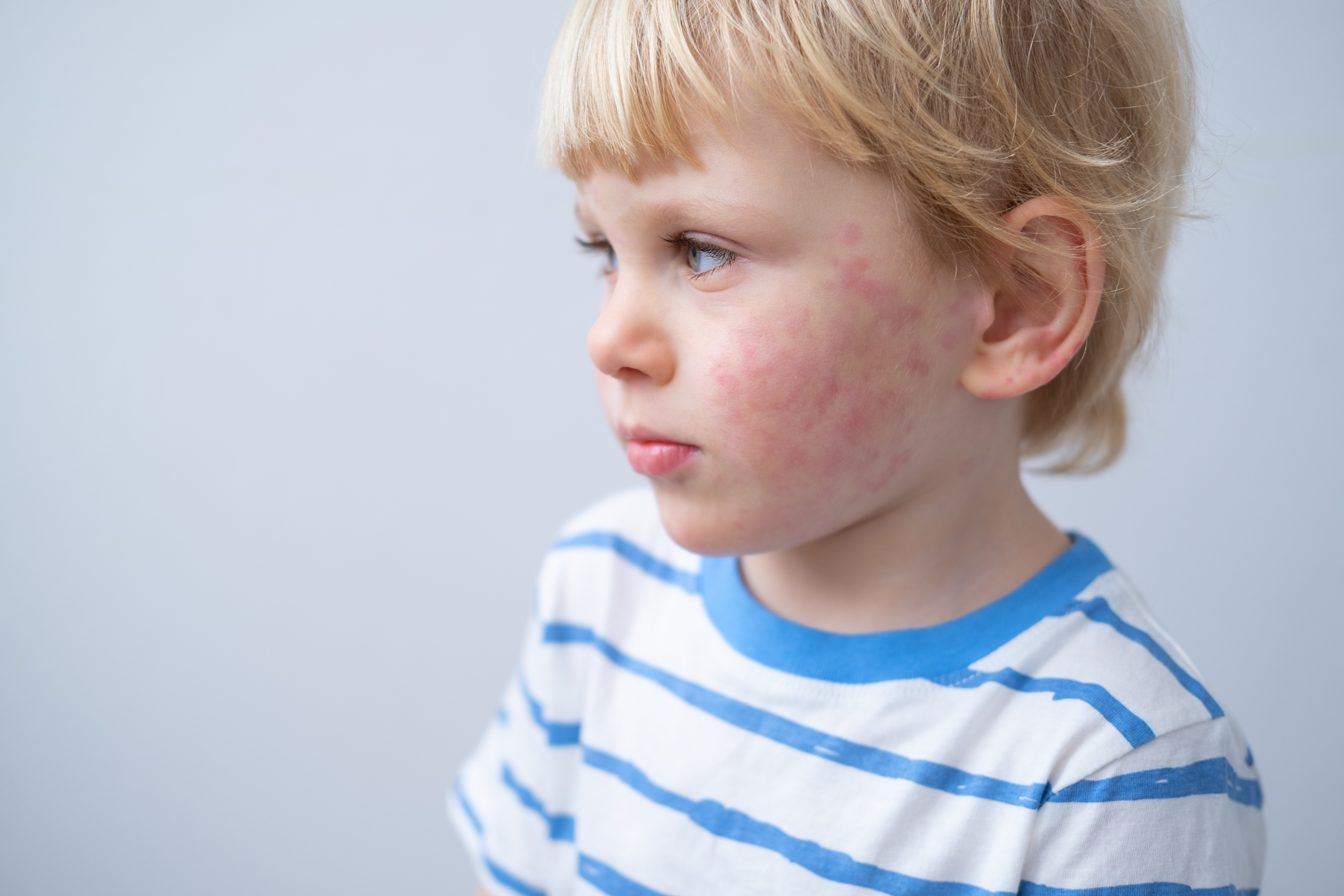Skin rash

A skin rash is an abrupt deviation of the skin, characterized by the sudden appearance of red, pink, or purple bumps or spots. This manifestation may occur with or without accompanying symptoms like itching, pain, or a burning sensation. It is essential to note that a skin rash is not a standalone diagnosis but serves as a crucial symptom indicating an underlying issue. Attempting to self-diagnose or treat a rash without proper guidance can potentially worsen the condition.
How Does a Skin Rash Look?.
The visual presentation of a skin rash includes the sudden emergence of red, pink, or purple bumps on specific body parts or more extensive areas. Additionally, a skin rash can be accompanied by itching, pain, burning sensations, or feelings of malaise and fever.
The unique appearance and characteristics of the rash can provide valuable insights into its potential causes. For details see the tab "Causes". However, it's crucial to recognize that certain rashes may exhibit similar visual features, necessitating careful examination by a healthcare professional.
- Rash due to infectious diseases
- Skin inflammation or infection
- Allergy related skinrash
- Insect bites
- Medication induced rash
- Rash due to childhood diseases

The causes of skin rashes are diverse, encompassing infectious diseases, allergies, autoimmune conditions, medications, heat, stress, clothing, insect bites, and more.
Understanding the classification of skin rash can shed light on may potentially causes your skinrash. They can be broadly categorized as seen in the list below.
- Viral Infections: Measles, mumps, rubella, chickenpox, and HIV can lead to distinct rashes.
- Bacterial Infections: Impetigo, folliculitis, and cellulitis may cause red, inflamed rashes.
- Fungal Infections: Skin fungi, like athlete's foot or ringworm, result in itchy blisters and redness.
- Food Allergies: Allergies to specific foods can manifest as skin rashes.
- Environmental Allergies: Pollen, dust mites, or certain fabrics may trigger allergic skin reactions.
- Lupus and Eczema: Autoimmune diseases often result in chronic skin inflammation and rashes.
- Psoriasis: Characterized by red, scaly patches, psoriasis is an immune-mediated skin disorder.
- Antibiotics and NSAIDs: Certain medications, like amoxicillin and ibuprofen, can lead to skin reactions.
- Epilepsy and Heart Medications: Drugs such as carbamazepine and beta-blockers may cause rashes.
- Detergents and Fabrics: Allergic reactions to specific detergents or fabrics may lead to rashes.
- Plants and Fungi: Exposure to certain plants like poison ivy or fungal infections can cause skin reactions.
- Insect Bites: Mosquito or tick bites can result in itchy, red spots.
- Parasitic Infections: Certain parasites may cause skin rashes, often accompanied by itching.
- Heat or Warmth: Exposure to high temperatures can lead to heat rashes with small, red bumps.
- Stress: Emotional stress may exacerbate existing skin conditions or trigger new rashes. Hormonal shifts during pregnancy or menopause may also contribute to skin rashes.

If an unexplained skin rash appears, it is crucial to refrain from attempting self-treatment to prevent potential worsening of the condition.
Instead, individuals should promptly schedule an appointment with their general practitioner or dermatologist for a comprehensive examination. In cases where the rash persists or intensifies, seeking medical advice is essential.
Emergency signs, such as extreme forms of rash or severe allergic reactions, warrant immediate attention, possibly even a visit to the emergency room.
While most skin rashes are benign and tend to resolve on their own, several measures can help alleviate discomfort and promote healing:
- Maintain good hygiene: Regularly clean and dry the affected areas.
- Identify and avoid triggers: Determine potential allergens or irritants and take steps to minimize exposure.
- Refrain from scratching: Avoid scratching the rash to prevent further irritation and aid in natural healing.
- Use pH-neutral soap: Opt for gentle, fragrance-free soap to minimize skin irritation.
- Stay hydrated: Drink an adequate amount of water to prevent dryness and promote skin recovery.
- Moisturize your skin: Apply a nourishing cream suitable for sensitive skin to maintain skin hydration.
- Choose breathable clothing: Opt for garments made of breathable materials like cotton and linen to prevent irritation.
- Adopt a healthy diet: Ensure a balanced and varied diet to provide essential nutrients for skin restoration.
Given the broad spectrum of skin rashes and the potential for various underlying causes, it is highly recommended to consult with a healthcare professional or MIA for a thorough examination and proper assessment of your rash. Seeking professional guidance ensures accurate diagnosis and appropriate treatment, tailored to the specific nature of your skin condition.